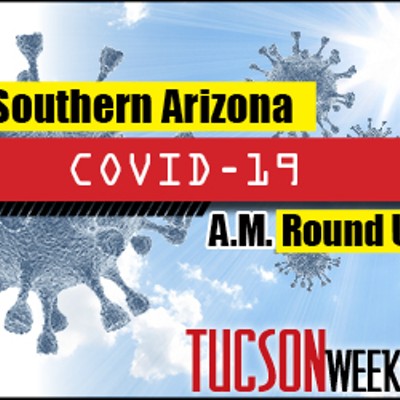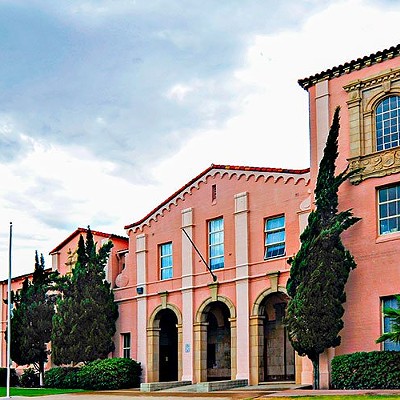Those are among the questions now being argued in United States District Court as Mendoza seeks monetary damages from the district.
The facts of the case are fairly straightforward. Mendoza was hired in 1995 as principal of TUSD's largest high school against the wishes of board member Gloria Copeland. While others praised her performance at the school, Copeland complained about her work.
In June of 1998, the TUSD board voted to transfer assistant principal Paul Hatch from Tucson High. This upset Mendoza and others, so they arranged for a protest meeting to be held at the school. To publicize the event, they mailed a notice to Tucson High parents and paid $879 for postage out of the faculty fund. Monies in this account came from donations and parking revenues generated during the nearby Fourth Avenue Street Fair.
Copeland unsuccessfully did everything she could to stop the meeting from happening. She demanded the group have rental and insurance agreements to use the school since the "meeting is not a TUSD function (or at least should not be)."
Copeland also wrote about the meeting, "If any staff member is involved in this, I will become gravely concerned since it is expected that, whether or not staff personally agrees, Board decisions will be supported publicly even though there may be private thoughts to the contrary."
Despite Copeland's best efforts, the meeting was held. The school board member then insisted auditors look into how the mailing was paid for. As part of this investigation, TUSD senior legal counsel Jane Butler issued subpoenas to obtain bank records. The subpoenas indicated they were needed for a third-party employee disciplinary hearing in a case that apparently never existed.
Despite that, the financial records were produced and used against Mendoza. She was reprimanded by her supervisor, a decision that was later overturned by a hearing officer.
Mendoza also faced disciplinary action from the TUSD board, since it considered the use of the faculty fund to pay for mailing the meeting notices a misuse of public money. In November of 1998, outside attorney Ronna Fickbohm told the board that Mendoza might have committed a Class IV felony, which is punishable by up to four years in prison. The issue was then turned over to the Pima County Attorney's Office, which declined to prosecute the school principal.
The matter didn't end there, though. Mendoza said later that because of the public accusations made against her, "My effectiveness as principal was diminished to the point where I thought I was damaging the school by remaining as principal and I had no choice but to seek employment elsewhere." She resigned her position in June of 1999 and left the state.
BUT MENDOZA DIDN'T GO quietly. She filed suit against TUSD, Copeland and attorney Fickbohm alleging they violated her First Amendment rights to free speech, did not provide her due process, and defamed her. She is currently seeking unspecified monetary damages in U.S. District Court.
Among the arguments that Mendoza's attorneys make to show the district's malicious intention are the issuance of what they call "sham subpoenas" for a nonexistent disciplinary hearing concerning an unrelated third party. The use of these subpoenas, according to a court memorandum filed in behalf of Mendoza, "was clearly illegal. ... The use of blatantly false information in the subpoenas coupled with the threat of contempt is mind boggling. The fact that such abuse of process occurred in a political subdivision and from such high level as the senior counsel for the school district is terrifying, to say the least."
Of course the school district, Copeland and Fickbohm all deny Mendoza's charges and argue that her employment opportunities weren't harmed. As for the use of make-believe subpoenas, attorneys for TUSD say that they are irrelevant since they weren't directed at Mendoza and they were not asking for information about her bank accounts.
But what about the ethics of a governmental agency using fake subpoenas to obtain investigative information? In the opinion of Theodore Schneyer, the Milton O. Riepe professor at the University of Arizona's law school, "I don't think it is permissible for a hearing you know isn't going to take place. There at least should be a minimal justification required for the subpoenas."
While Schneyer says a complaint over the subpoenas could be filed with the State Bar Association, he doesn't hold out much hope for action. "It may hit the papers," the professor says, "but may never get as far as a public hearing since it could be considered trivial compared to cases of lawyers stealing money from their clients and running off to Rio."
As for the Mendoza lawsuit, Copeland has stated she didn't dislike the Tucson High principal. But current TUSD board member Judy Burns remembers it differently. "Gloria Copeland called me and I told her to leave Cecilia Mendoza alone because I didn't want to see yet another change in administration at Tucson High. But she clearly had negative feelings toward Mendoza."
Burns adds that if she had been on the school board at that time, she privately would have said something to Copeland about her behavior. Publicly, though, she doesn't know what she would have done. But, she says, "It seems to me that when they tried to show criminal intent [on Mendoza's part], that was going too far."
Cecilia Mendoza now lives in northern California where she is employed at another school. Paul Hatch is a principal in Mexico. Gloria Copeland badly lost her 1998 bid for re-election to the TUSD board. Meanwhile, Mendoza's court case may result in her being awarded a very substantial amount of money, all because of $879 for stamps, and the principle of the matter.












